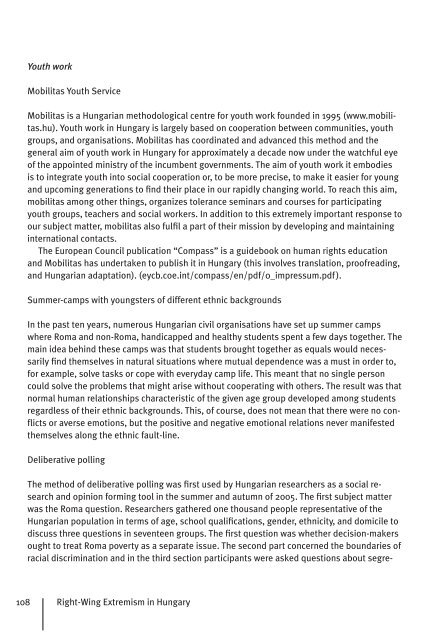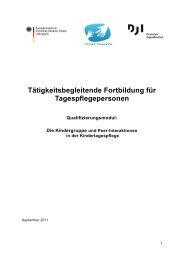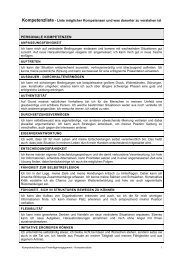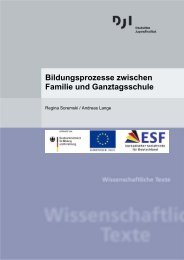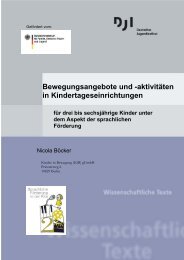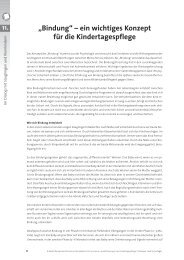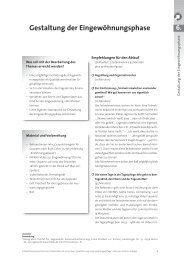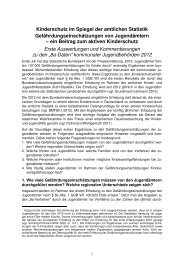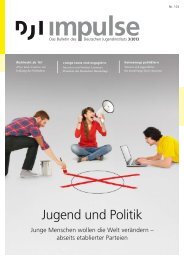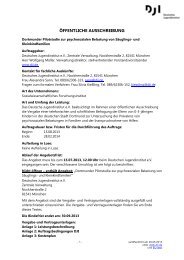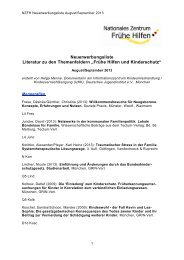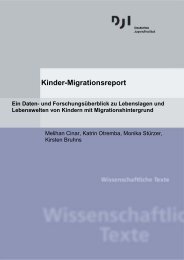Prevention of Right-Wing Extremism, Xenophobia and Racism in ...
Prevention of Right-Wing Extremism, Xenophobia and Racism in ...
Prevention of Right-Wing Extremism, Xenophobia and Racism in ...
Create successful ePaper yourself
Turn your PDF publications into a flip-book with our unique Google optimized e-Paper software.
Youth work<br />
Mobilitas Youth Service<br />
Mobilitas is a Hungarian methodological centre for youth work founded <strong>in</strong> 1995 (www.mobili-<br />
(www.mobili-<br />
tas.hu). Youth work <strong>in</strong> Hungary is largely based on cooperation between communities, youth<br />
groups, <strong>and</strong> organisations. Mobilitas has coord<strong>in</strong>ated <strong>and</strong> advanced this method <strong>and</strong> the<br />
general aim <strong>of</strong> youth work <strong>in</strong> Hungary for approximately a decade now under the watchful eye<br />
<strong>of</strong> the appo<strong>in</strong>ted m<strong>in</strong>istry <strong>of</strong> the <strong>in</strong>cumbent governments. The aim <strong>of</strong> youth work it embodies<br />
is to <strong>in</strong>tegrate <strong>in</strong>tegrate youth <strong>in</strong>to social cooperation or, to be more precise, to make it easier for young<br />
<strong>and</strong> upcom<strong>in</strong>g generations to fi nd their place <strong>in</strong> our our rapidly chang<strong>in</strong>g world. To reach this aim,<br />
mobilitas among other th<strong>in</strong>gs, organizes tolerance sem<strong>in</strong>ars <strong>and</strong> courses for participat<strong>in</strong>g<br />
youth groups, teachers <strong>and</strong> social workers. In addition to this extremely important response to<br />
our subject matter, mobilitas also fulfi l a part <strong>of</strong> their mission by develop<strong>in</strong>g <strong>and</strong> ma<strong>in</strong>ta<strong>in</strong><strong>in</strong>g<br />
<strong>in</strong>ternational contacts.<br />
The European Council publication “Compass” is a guidebook on human rights education<br />
<strong>and</strong> Mobilitas has undertaken to publish it <strong>in</strong> Hungary (this <strong>in</strong>volves translation, pro<strong>of</strong>read<strong>in</strong>g,<br />
<strong>and</strong> Hungarian adaptation). (eycb.coe.<strong>in</strong>t/compass/en/pdf/0_impressum.pdf).<br />
Summer-camps with youngsters <strong>of</strong> different ethnic backgrounds<br />
In the past ten years, numerous Hungarian civil organisations have set up summer camps<br />
where Roma <strong>and</strong> non-Roma, h<strong>and</strong>icapped <strong>and</strong> healthy students spent a few days together. The<br />
ma<strong>in</strong> idea beh<strong>in</strong>d these camps was that students brought together as equals would neces-<br />
sarily fi nd themselves <strong>in</strong> natural situations where mutual dependence was a a must <strong>in</strong> order to,<br />
for example, solve tasks or cope with everyday camp life. This meant that no s<strong>in</strong>gle person<br />
could solve the problems that might arise without cooperat<strong>in</strong>g with others. The result was that<br />
normal human relationships characteristic <strong>of</strong> the given age group developed among students<br />
regardless <strong>of</strong> their ethnic backgrounds. This, <strong>of</strong> course, does not mean that there were no con-<br />
fl icts or averse emotions, but the positive <strong>and</strong> negative emotional relations never manifested<br />
themselves along the ethnic fault-l<strong>in</strong>e.<br />
Deliberative poll<strong>in</strong>g<br />
The method <strong>of</strong> deliberative poll<strong>in</strong>g was fi rst used by Hungarian researchers as a social re- re-<br />
search <strong>and</strong> op<strong>in</strong>ion form<strong>in</strong>g tool <strong>in</strong> the the summer <strong>and</strong> autumn <strong>of</strong> 2005. The fi rst subject matter<br />
was the Roma question. Researchers gathered one thous<strong>and</strong> people representative <strong>of</strong> the<br />
Hungarian population <strong>in</strong> terms <strong>of</strong> age, school qualifi cations, gender, ethnicity, <strong>and</strong> domicile to<br />
discuss three questions <strong>in</strong> seventeen groups. The fi rst question was whether decision-makers<br />
ought to treat Roma poverty as a separate issue. The second part concerned the boundaries <strong>of</strong><br />
racial discrim<strong>in</strong>ation <strong>and</strong> <strong>in</strong> the third section participants were asked questions about segre- segre-<br />
108 <strong>Right</strong>-<strong>W<strong>in</strong>g</strong> <strong>Extremism</strong> <strong>in</strong> Hungary


